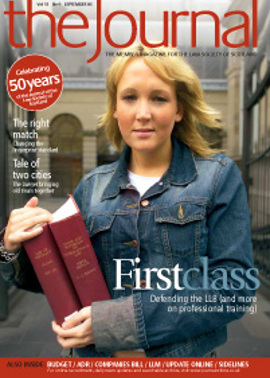From the grass roots

To most solicitors, the recent dispute over solemn criminal legal aid fees was unprecedented. The strength of feeling and apparent unanimity behind the dispute and the proposed boycott, the generally sympathetic press coverage, and the fact that a rise was finally offered and agreed, made a unique series of events.
But there was another notable factor. In the eyes of the profession, press and public, the driving force behind the dispute was not the Society but the profession at the front line, the local bar associations and faculties.
When the Council accepted the Executive’s offer, most local organisations were expected to concur. However murmurings quickly started. An email from the Glasgow Bar Association made it known that they had not yet reached a view and were unhappy with the timing of the acceptance. The press seized on talk of a new organisation being set up to represent the bar associations. Words like “schism” and “rival” were bandied about. Such descriptions are probably inaccurate. However a number of people may feel that it isn’t such a bad idea, and, facing a number of battles with the profession, the Executive will be watching and waiting.
The “grass roots” nature of the dispute worked to our advantage. It gave a demoralised and disillusioned sector of the profession a voice. It allowed the Society to say to the Executive: “talk to us or deal with the angry mob”. However, if a gap develops between the Society and the profession, sooner or later it will be used against us. Who we expect to lead us in matters such as these is therefore a question which needs to be sorted out.
Some practitioners don’t have a great deal of faith in the Society achieving results. But if the bar associations took the lead, what would happen if Glasgow and Edinburgh, for example, disagreed? How much clout would smaller areas have? Would the Executive have the perfect opportunity to “divide and conquer”?
The Society has the clout of numbers behind it and is the only means of ensuring that the profession cannot be divided and defeated in detail. However the direction in which the Society leads has to be one in which the profession wants to go, or can be persuaded to follow.
Perhaps the answer lies in the reason why the faculties and bar associations managed to muster such support. In general, they tend to be composed of people working in close proximity to each other, who see themselves as all in the same boat, feel they have more “ownership” of decisions and are happier to stick together.
Can this be replicated in the Society? Yes. The mechanism already exists: Council members.
Answer honestly. Do you know what your Council member is doing on the issues affecting your practice? Do you know who they are? Have you spoken to them recently? Do they know what you think about an issue?
I suspect that many of the people who feel that the Society is unrepresentative will answer “no” to one or more of these. If you have answered “yes”, but still feel that no-one’s fighting your corner, what are you going to do about it?
Remember that your Council member is the person who was acting in that case or transaction you dealt with last week. They are in the same boat as you and probably feel pretty much the same way about things. At the same time, Council members are busy: done properly, the job takes a lot of time and commitment, particularly if you aren’t handy for Edinburgh.
In a way, it’s much like the day job. Constituents are like clients. Communication is all-important. Sometimes the representative needs to contact the client; sometimes it’s up to the client. When communication is mutual and effective, the system works well.
Where it isn’t working, first check that you are doing your bit in communicating. If you are, and don’t think your Council member is doing things properly, or representing your view, do something about it. Find someone else to stand. Or do it yourself. Perhaps your local faculty can provide a link between Council members and constituents, delivering tangible feedback and support. If the commitment is too much for you as an individual, the Society will be happy to discuss the feasibility of job-sharing or other measures.
The recent dispute shows that results are sometimes achieved not by reason, but by politics, lobbying and the media. Expectations may need to be managed – but, most of the time, results that satisfy the profession are possible. All that is needed is that the profession puts a similar effort into what is going on in Drumsheugh Gardens as it did into mobilising support for a criminal case boycott.
There’s no point in asking what the Society can do for the profession if members aren’t prepared to stand up, be counted and do something themselves. The profession does “own” the Society. With a bit of effort on everyone’s part, it can believe that.In this issue
- Sincere thanks are due
- From the grass roots
- Training solicitors and teaching law
- Survival of the fittest?
- A new print job
- Plenty more besides
- That's settled, then
- East meets west
- A shot in the arm
- Tapping into CPD Online
- Master trainee
- Glitch hunt, not witch hunt
- A caveat on witnesses
- Victories for tenants?
- On your marks...
- Big bill for business
- Ripple effect
- How fair is fair?
- Scottish Solicitors' Discipline Tribunal
- Website reviews
- Book reviews
- Spinning plates
- Sending the right signals






